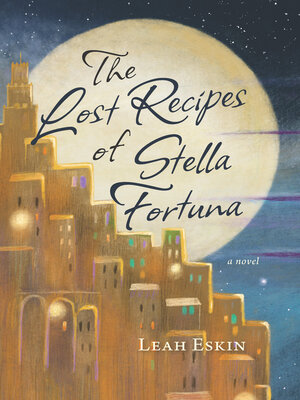
Sign up to save your library
With an OverDrive account, you can save your favorite libraries for at-a-glance information about availability. Find out more about OverDrive accounts.
Find this title in Libby, the library reading app by OverDrive.



Search for a digital library with this title
Title found at these libraries:
| Library Name | Distance |
|---|---|
| Loading... |
This debut novel from food writer Leah Eskin of the Chicago Times combines the historical sweep and emotional power of The Invisible Bridge by Julie Orringer and the resonant use of food and recipes of Like Water for Chocolate by Laura Esquivel.
The story opens on the mountaintop city of Pitigliano, Italy, once called Little Jerusalem for its vibrant, centuries-old Jewish community. But the year is 1943. Mussolini has enacted anti-Jewish laws across Italy, and the family of Stella Fortuna struggles to maintain any sense of their former life. Then one night a neighbor comes to their door holding a ricotta pudding, and tells them "You must leave now. You're in grave danger." The Nazi's have arrived to help the Fascists of Italy enact their own Final Solution.
Grabbing what few things they can carry (and the pudding), Stella Fortuna escapes into the woods below Pitigliano with her two older brothers and younger sister, Marcella. What follows is a desperate months-long flight. Precarious stays with sympathetic, but fearful families in the countryside, dodging the ever-closer Fascists in pursuit while Stella dreams of romance, the comforts of home, and the food that was not just her mother's love: it was the delicious expression of an entire culture in danger.
In a separate timeline, Edda Servi Machlin is a housewife in 1960s Westchester trying to make sense of a new culture, and the "spaghetti and meatballs" food that passes for Italian cuisine. With caustic wit, we see twentieth-century America through an immigrant's eyes, someone who can never return to her former home, because it no longer exists. Someone who comes to understand that it might be up to her to preserve the indelible flavors of a Jewish-Italian way of life that is in danger of extinction, as her family once was.
In between these two remarkable stories are more than forty recipes (updated for today's cooks), all inspired by the life and example of Edda Servi Machlin, author of The Classic Cuisine of the Italian Jews.
The delectable taste of this novel will linger with readers, even when the book is closed.







